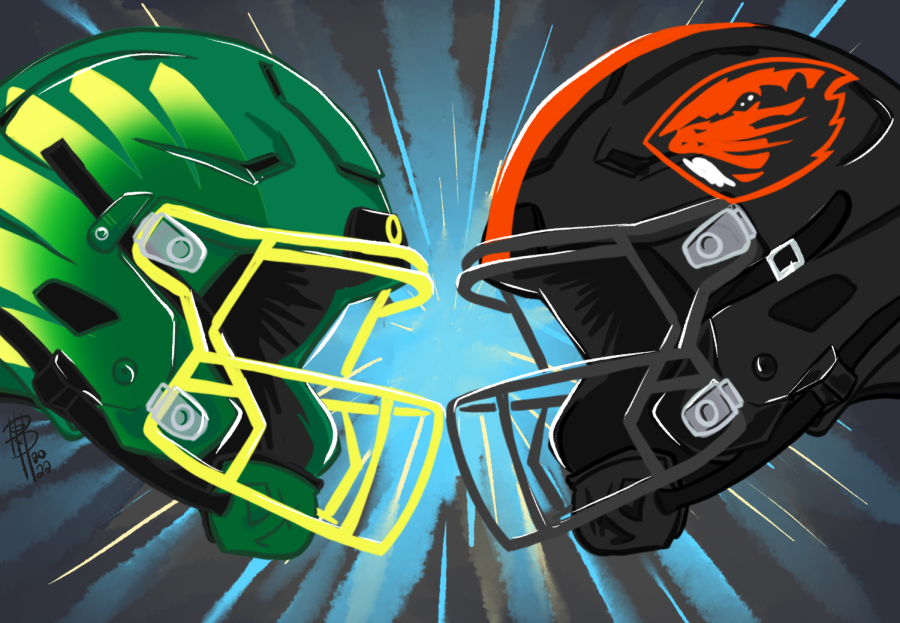Oregon-Oregon State rivalry finds a new name after being set for 83 years
An illustration depicting an Oregon State University football helmet and University of Oregon football helmet facing off against one another. With the recent controversy of the game’s previous name.
November 28, 2022
Dating back to 1894, the intense rivalry between the Corvallis school and the opposing school in Eugene began with a scrimmage, when the then Oregon Agricultural College Coyotes won against the then University of Oregon Lemon-Yellows in a score of 16-0.
It wasn’t until 1916 when Oregon State College switched its mascot to the Beaver that the school’s yearbook renamed itself “The Beaver” after the state animal.
The name “Civil War,” however, didn’t come along till long after the first game. As the inaugural game continued to take place, it began to draw more and more attention with over 15,000 spectators in Multnomah Stadium (now Providence Park) in 1908.
With many new and dedicated fans coming into the picture, it wasn’t uncommon for fans to get too carried away. With the definition of a civil war being a war between citizens of the same country or state, the UO football coach John McEwan (1926-1929) felt it would be a fitting title since it was the rivalry of two schools in the same state.
Before it was deemed the “Civil War”, many people would refer to the game as either the “Oregon Classic” or “State Championship Game.” People began to shift to using the term “the Civil War” in 1938 when the nickname about the war began to pick up traction after the OSC publication “The Beaver” referred to
the game as “the Civil War” when discussing the 1937 season.
As of 2020, this game has been played 125 times placing it in the top ten most-played college football series.
Two years ago in 2020, the two schools came together and agreed to revoke the renowned title when the murders of Breonna Taylor and George Floyd had been brought to light alongside the entire Black Lives Matter movement.
With input from both the current and former athletes, the schools concluded the name “Civil War” still has ties back to the United States Civil War and slavery, despite not being related.
Previous OSU president Ed Ray released a statement regarding the decision shortly after: “Changing this name is overdue as it represents a connection to a war fought to perpetuate slavery. While not intended as reference to the actual Civil War, OSU sports competition should not provide any misconstrued reference to this divisive episode in American history. That we did not act before to change the name was a mistake. We do so now, along with other important actions to advance equal opportunity and justice for all and in recognition of Black Lives Matter,” Ray said.
Continuing into the future, and confirmed by Football Athletic Communications Member Shawn Schoeffler: “It’s called the Rivalry Series.”
The Rivalry Series is set to be the branded name moving forward, agreed upon between both OSU and the UO. The new name holds no connection to the mistreatment of African Americans and is placed to only focus on the football rivalry between the two schools.










































































































